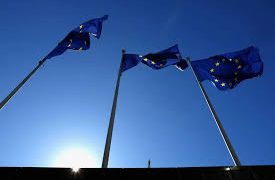Democratic Security: Europe’s Strategic Imperative
Europe stands at a critical crossroads. Geopolitical tensions, internal democratic backsliding, and hybrid threats are converging into what Council of Europe Secretary General Alain Berset has described as a “perfect storm” (Portal). Against this backdrop, democratic security is being asserted as not just a virtue but a strategic necessity.
This concept is gaining attention from institutions like the European Commission, Council of Europe, and European Political Community (EPC), which view it as vital to Europe’s long-term stability.
This article explores what democratic security means, why it has become urgent, what steps are being taken, and what challenges still remain.
What is Democratic Security
Democratic security refers to the protection and strengthening of democratic values as the foundation of national and continental security. It encompasses the rule of law, human rights, free and fair elections, media pluralism, and freedom from disinformation (European Commission).
Unlike traditional notions of security that focus solely on military strength, democratic security integrates both soft and hard elements:
- Soft security includes civic rights, resilient institutions, and information integrity.
- Hard security covers defense, border protection, and deterrence strategies.
By merging these aspects, Europe aims to collapse the outdated divide between governance and defense.
Democratic security assumes that democracy must be defended both internally—against erosion of institutions—and externally, from foreign interference or authoritarian influence (EPD, European Commission).
It therefore calls for governments to resist disinformation, prevent electoral manipulation, and ensure that institutions remain accountable, transparent, and resilient (Portal, Euronews).
Why the Imperative Has Intensified
Several interrelated developments have pushed democratic security to the forefront of Europe’s policy agenda:
1. Hybrid Threats and Disinformation
Europe is increasingly targeted by foreign manipulation, including disinformation campaigns, election interference, and covert online influence (European Commission).
These hybrid threats aim to undermine trust in democratic institutions, polarize societies, and destabilize governance (Euronews).
Agents operating below the threshold of conventional warfare exploit digital vulnerabilities and social divisions. Democratic security provides the framework to build information resilience and protect the public sphere.
2. Democratic Backsliding
Some EU member states have shown signs of weakening democratic norms. Issues such as judicial interference, restrictions on press freedom, and civil society pressure are eroding institutional independence (European Commission).
Maintaining checks and balances and rule of law has therefore become urgent.
3. Geopolitical Instability and War
Russia’s aggression in Ukraine has tested Europe’s resolve and capacity to uphold democratic principles under stress (Portal).
Europe’s response—through sanctions, support for accountability mechanisms, and judicial reforms—reflects a commitment to ensuring justice and governance continuity during conflict.
4. Convergence of Crises
Europe faces overlapping challenges—migration pressures, climate change, cybersecurity threats, and technological disruption—which strain democratic governance (Consilium, Portal).
Each of these crises demands decisions that test democratic accountability and transparency.
5. Global Democratic Decline
Worldwide, autocratic regimes are becoming more assertive, exporting influence through technology, propaganda, and economic pressure (Portal).
For Europe, maintaining internal democratic strength is essential for its external credibility and global leadership.
What Is Being Done
Europe has launched several coordinated initiatives to translate democratic security into action:
1. European Democracy Shield
Proposed by the European Commission, this initiative focuses on countering foreign information manipulation and interference (FIMI), ensuring free elections, and strengthening civic engagement (EPD, European Commission).
It forms the backbone of Europe’s resilience against disinformation and hybrid attacks.
2. Defence of Democracy Package
Complementing the European Democracy Action Plan, this package introduces legal tools and institutional safeguards to protect media freedom and enhance transparency in political advertising and funding (European Commission).
3. Strategic Compass for Security and Defence
Adopted in 2022, this EU-wide framework aims to unify Europe’s approach to security by 2030.
It aligns defense, investment, and partnership strategies across four pillars—Act, Secure, Invest, and Partner—integrating democratic governance with security planning (Consilium).
4. Council of Europe and EPC Summit Leadership
The Council of Europe and European Political Community have positioned democratic security as a core strategic principle.
At the EPC Summit in Tirana, leaders emphasized that Europe’s security architecture must protect not just borders, but also institutions, rights, and freedoms (Portal, Euronews).
5. Accountability in Conflict Zones
In Ukraine, the Register of Damage, plans for a Special Tribunal for Aggression, and judicial support programs aim to uphold democratic governance even during war (Portal).
Risks and Challenges
Despite progress, several risks could undermine democratic security:
- Unchecked Militarization: Secretary General Berset warns that rearmament without democratic oversight could empower extremist governments (Portal).
- Uneven Implementation: Variations in political will and resources across states may create vulnerabilities.
- Balancing Liberties and Security: Overzealous countermeasures could restrict free speech or privacy.
- Evolving Disinformation: Advanced AI-generated propaganda (deepfakes, microtargeting) poses new detection challenges.
- External Pressure: Cyberattacks and economic coercion from authoritarian powers threaten sovereignty.
Why Democratic Security Is Essential
- Legitimacy and Social Cohesion – Democracies that protect rights and fairness foster unity and resilience.
- Resistance to Threats – Robust institutions withstand both internal polarization and external manipulation.
- Peace Preservation – Preventing authoritarian drift avoids institutional capture and instability.
- Global Credibility – Upholding values sustains Europe’s diplomatic and moral influence.
- Integrated Prosperity – Economic growth, defense, and social trust depend on strong democratic governance.
What Must Happen Next
To transform rhetoric into results, Europe must:
- Strengthen Legal Frameworks – Enhance electoral integrity, media freedom, and transparency.
- Integrate Institutions – Deepen EU-Council cooperation and intelligence sharing (Consilium).
- Increase Funding – Support civil society, independent media, and anti-disinformation tools.
- Promote Public Awareness – Boost media literacy and civic education (EPD).
- Maintain Oversight During Crises – Prevent executive overreach during emergencies.
Conclusion
Democratic security has evolved into Europe’s strategic imperative.
With crises converging, protecting democratic norms is as crucial as defending borders. Initiatives like the European Democracy Shield, Strategic Compass, and Council of Europe programs offer promising frameworks—but their swift, even, and transparent implementation is key.
If democracy erodes, Europe risks losing its security, cohesion, and credibility.
As Alain Berset cautions, “Rearmament without democratic safeguards risks turning power against our own values.”
Europe’s mission now is clear: fortify democracy to secure its future.








